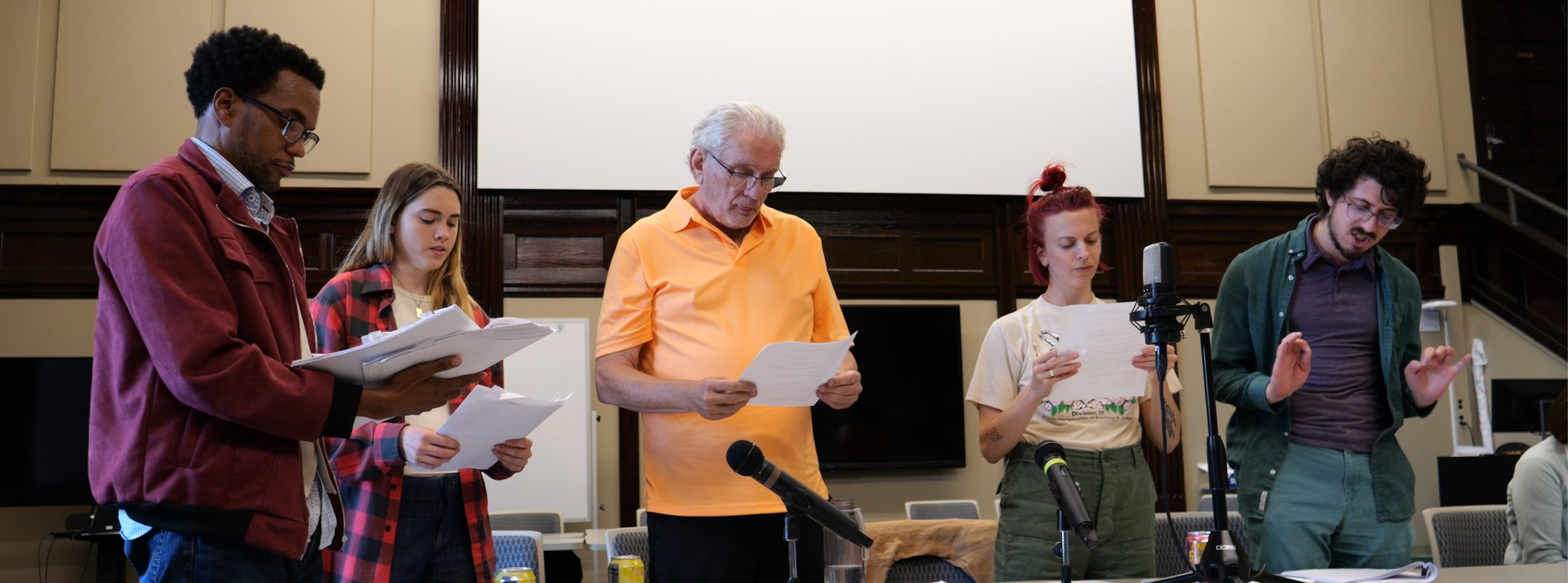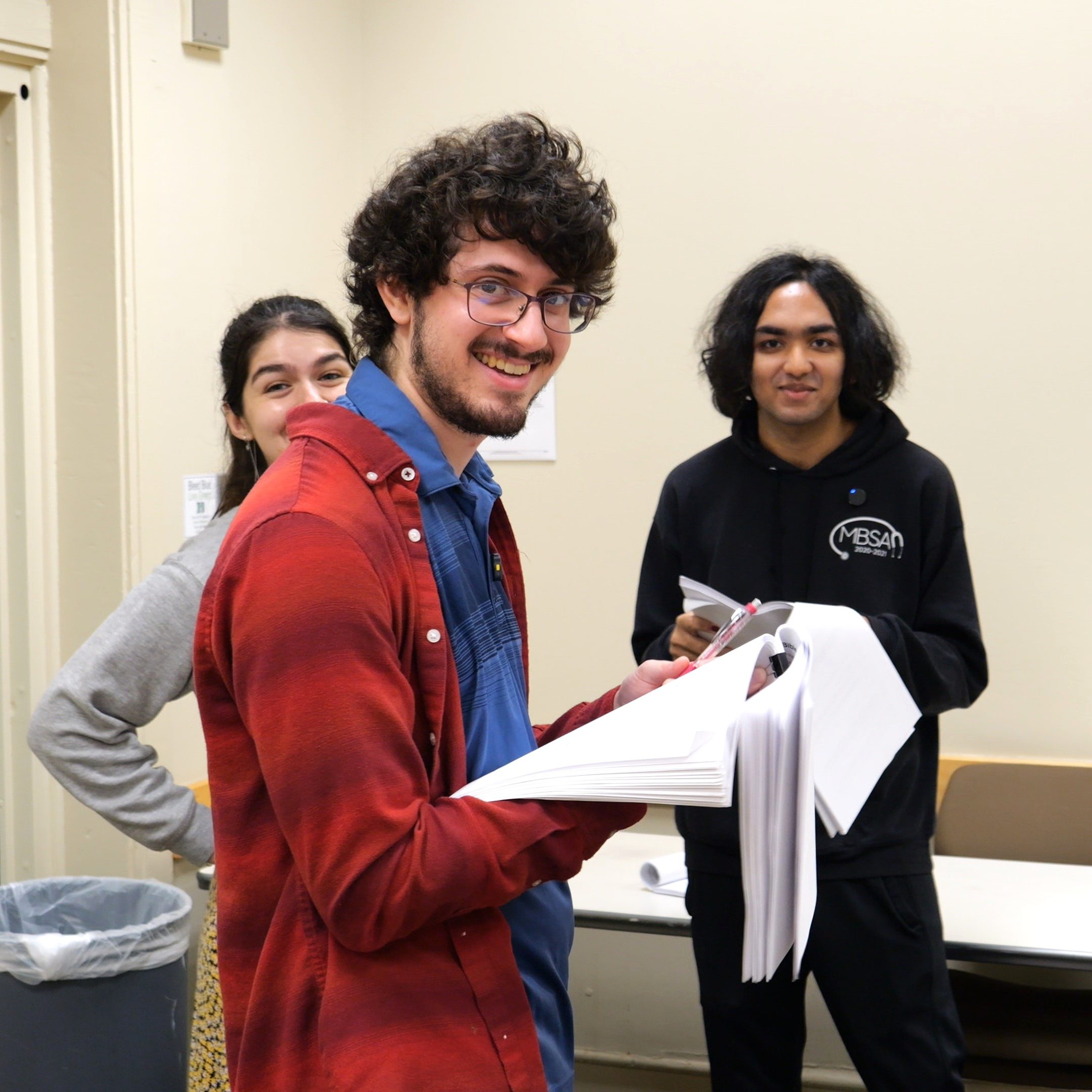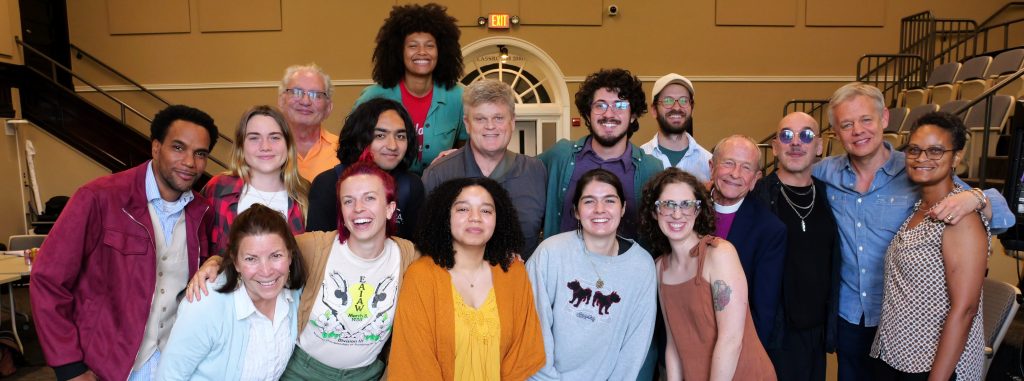

Over the summer, Duke Arts launched Arts+, a six-week program for Duke students to explore arts administration and arts research/practice. Arts+ joins other (+) programs across Duke offering funded experiential education opportunities so students may build disciplinary and professional skills. In 2024, Arts+ teams were led by Duke Arts administrators, arts faculty, and a Duke alum artist. Participating students included those pursuing degree credentials in the arts and a range of other disciplines such as biology, computer science, economics, international comparative studies, and public policy.
Arts+ student Aidan Klein recently shared his experience workshopping a new verbatim play with that Duke alum, award-winning filmmaker Daniel G. Karslake (T’87) and his collaborator, acclaimed choreographer/director Javier De Frutos, alongside fellow students Augustus Adams, Em Liptow, Izzy Dudlyke, and Ondine Peck-Voll.
Project Researching & Learning

Dan and Javier’s play is currently untitled. It is a verbatim work adapted and extended from two of Dan’s documentaries (For the Bible Tells Me So & For They Know Not What They Do) following several Christian families with gay and trans children, discussing the broader issue of fundamentalists stigmatizing LGBTQ+ identities.
We were thinking of some possible names—I’m personally a fan of For The They Bible Knows Not What It Tells Me So Do, although they don’t like it for some reason.
Verbatim theatre is loosely defined, but it typically involves true stories with real speech, usually from interviews, depicted verbatim by actors onstage.
We looked at some examples—Reality, which is about a woman interrogated for leaking NSA documents about Russian interference in the 2016 US election; London Road (which Javier choreographed!) about a string of murders in the small town of Ipswich, England; and The Laramie Project, about the murder of openly gay Mathew Shepard in Laramie, Wyoming in 1998. Each film took a very different approach to verbatim theatre and showed us what the medium was capable of.

Progress towards editing and revising the script
First, we were instructed to “action” the script by outlining which sections felt like the interviewees were speaking openly and spontaneously, which sections felt more cautious and rehearsed, and think about what characters we wanted to play.

For the first table read, I played Anita Bryant’s husband, Bob Green, and Bishop Gene Robinson’s late father, Victor, who is this effervescent old man with a really charming Southern accent. I did my best to imitate Victor’s manner of speaking for the reading, and Dan and Javier were so enamored that I ended up being our resident impressionist.
I played him as well as Harold Porcher, various politicians and evangelists, and several other one-offs—there were so many characters and we switched around so often, everyone probably read at least five or six different roles at any given point.
During this process, local community actors joined us during the readings to act out the remaining characters. The community actors were wonderful actors and people, and it was great getting to know them and learning about the Durham community that we’re kind of isolated from in the Duke bubble.
As for the collaboration, even though we (the students) had been working with Dan and Javier for two weeks, once the workshop started and everyone was situated, we were all working towards a common goal and everyone contributed to the revision process relatively equally.
Final Table Reading
I was excited for this reading! I love a good performance, and we had already done a full readthrough to make sure we were prepared. It was a pretty casual event, invite only, but there was a decently sized audience (slightly larger than I had expected) with some friendly faces. One of the attendees was Gene, an openly gay bishop in the Episcopal Church, a character in the script and a part of the reading.
I was a bit worried about how Gene would respond to a 20-year-old doing an impression of his deceased father, but thankfully he loved it. I won’t forget this—after the show, as I was passing Gene in the hallway, he said to me, “My dad is smiling down on you.” Ach, my heart! What an incredible man!
The reading itself was a success! Everything went according to plan, the audience seemed to enjoy it, and it was satisfying to be able to present our work from the past four weeks, outside of the random and confusing sneak peeks we gave the other Arts+ cohorts during our weekly project meetings.
Reflections
This workshop was a good lesson in taking artistic inspiration from conversation and the imperfect beauty of natural speech.
I’ve experimented a little with verbatim playwriting, and may incorporate verbatim elements in my future works. It hasn’t swayed me from my resolute path of not knowing what I want to do after college, but who knows, maybe I have a future in voice acting (seriously, if anyone reading this needs a voice actor, call me).
We’ll see what connections come from this! My studies are very arts-centered, so I imagine I’ll be working with Duke Arts again in the near future. This experience has also opened me to similar opportunities to develop new theatre at Duke, like Theater Studies’ New Works Labs Residencies and Hoof ‘n’ Horn’s New Works program. Finally, I hope to reconnect with Dan and Javier, and everyone else involved to see the finished play!

Photos by Rob Underhill
2025 Arts + summer project teams will be announced soon! Keep an eye out for more information on the page linked below.